“To have air supremacy is to win”: General Giulio Due and his theory of air warfare
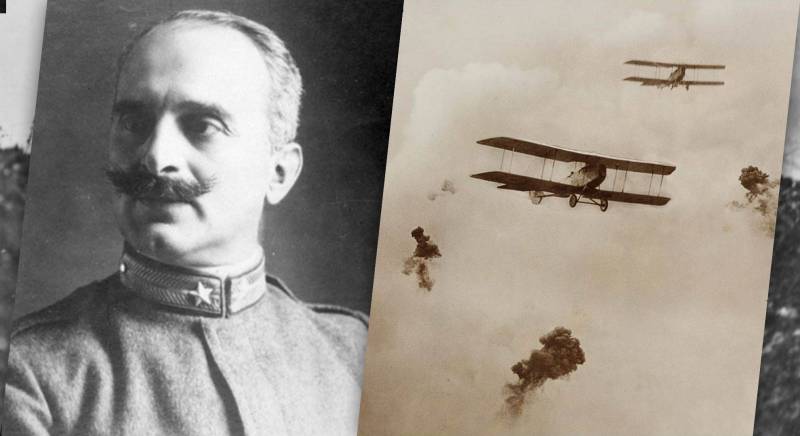
The concept of “air supremacy” arose during the First World War, at the dawn of development aviation. At the same time, the first theories of air warfare appeared - a concept that assigned the leading role to the Air Force in military operations and recognized their ability to independently achieve strategic goals in war. The founder of the theory of air warfare by strategic aviation is the Italian general Giulio Douhet.
Giulio Douhet was the founder of the development of methods for using strategic aviation and, in particular, the theory of “strategic bombing,” that is, the delivery of massive bombing attacks on strategic targets located deep behind enemy lines. As researchers note, the Italian general was one of the first among military theorists of the interwar period to analyze the nature of the past world war, find out the reasons for the crisis of positionality and put forward his version of waging a future war [3].
J. Douhet believed that, having gained air supremacy, aviation was capable of deciding the outcome of the war by striking state and economic centers behind enemy lines. At the same time, the attitude towards the concept of the Italian general regarding the conduct of air warfare in scientific circles has been ambiguous - he has both well-known followers, such as US Army General William Mitchell, who is considered the father of the American Air Force, and critics (at one time this concept was sharply was criticized and denied by Soviet science).
It is worth noting that there are rather scarce sources in Russian that provide an analysis of the Douai Doctrine - this includes Igor Drogovoz’s book “Air Blitzkrieg: The Douai Doctrine in the 1920st Century or Was the Italian General Right?” and a number of small articles where this issue is addressed, both directly (as in the article by historian A. A. Chernilovsky “Forecasting a future war in the XNUMXs by the Italian general Giulio Douhet”) and indirectly.
We will discuss General Giulio Douhet and his doctrine of air warfare in this material.
“The Disgraced General”: the military career of Giulio Douhet
Quite a bit is known about the life and military career of the Italian general - as mentioned above, this is primarily due to the scarcity of sources in Russian.
With foreign sources the situation is much better. For example, in 2017, the book Fra guerra, aviazione e politica was published in Italian. Giulio Douhet, 1914–1916 (“Between war, aviation and politics. Giulio Due, 1914–1916."), which, based on extensive documentation, analyzes the writings and thoughts of Giulio Douhet during the Great War in the context of the relationship between the military and political elite. Unfortunately, the Russian reader does not have the opportunity to familiarize himself with it.
It is known that General Giulio Due was born in the Italian city of Caserta on May 30, 1869 into a family of hereditary military men. He graduated from the Artillery and Engineering School in Turin and the General Staff Academy, receiving the rank of artillery officer, and served in the artillery units of the Italian army.
During the Italo-Turkish War of 1911–1912. Douhet was appointed commander of the aeronautical battalion, Italy's first aviation unit. Italy became the first country to use aircraft in combat during the Libyan war over Tripoli. Based on this experience, J. Douhet published his first manual, “Rules for the Handling of Military Aircraft,” in 1913.
It was thanks to the support of the aviator battalion commander Giovanni Douhet that the Caproni Ca.1 - Ca.3 (Ca.30 - Ca.36) bombers appeared - he allowed his friend, aircraft designer Giovanni Caproni, to build a three-engine bomber with a power of 300 hp. pp., without obtaining permission from senior management. The prototype made its first flight in October 1914 [7].
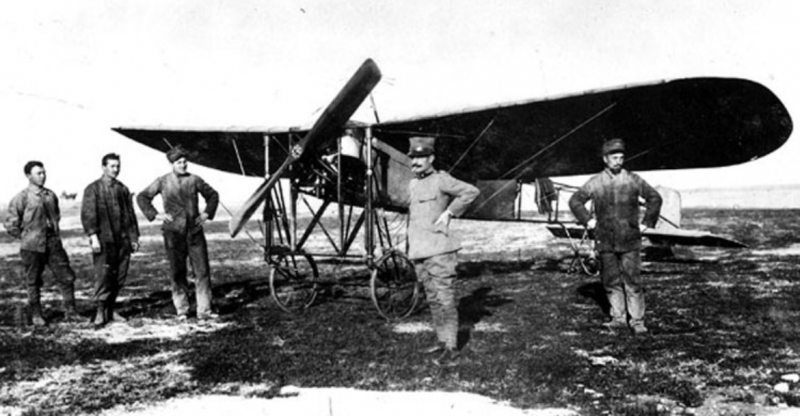
Considering that the device was tested without the knowledge of the ministry, Douhet was relieved of his post and transferred to the Milanese infantry division. At first they reacted more than coolly to the new product - the inspector of aeronautics, General Maurizio Maurice, rejected the project, calling it "technically flawed and militarily useless".
However, when Italy entered the war against Austria-Hungary in May 1915, the three-engine Caproni design became the most sought after military aircraft in the Italian arsenal and was recognized as one of the best bombers in the world.
In the months leading up to Italy's entry into the Great War (World War I), from August 7, 1914 to March 26, 1915, Douhet published war materials in several publications - for example, on the pages of the Turin newspaper La Gazzetta del Popolo (a nationalist and liberal newspaper under edited by Delfino Orsi, at that time one of the best-selling newspapers in Italy), under the pseudonym Spectator, 156 of his articles were published, which commented on the fighting, including in a critical manner [4].
After the outbreak of the war, outraged by the unpreparedness of the army and the incompetence of the command, J. Douhet entered into correspondence with his leadership and government officials, criticizing the conduct of the war and advocating solutions using aviation. Having come to the conclusion that a ground offensive could not be won, he proposed a strategic plan to bomb Austria-Hungary with 500 bombers, arguing that such a concentration of aircraft would be enough to cause such destruction to the Austrian economy and paralyze the home front and morale that Austria-Hungary agree to surrender [5].
Douhet's plan seemed too radical and fantastic to the leadership and was rejected. However, public criticism of the military command, as well as gloomy forecasts in which Douhet predicted a catastrophe for the Italian armed forces, did not go unnoticed - the last straw in the patience of the military leadership was a memorandum to the cabinet of ministers, in which the general criticized the Italian military leaders - he was arrested and sentenced by a military tribunal to imprisonment for one year and resignation.
However, even during the year of imprisonment in the fortress, he continued to compose notes and write various essays on military topics - on issues of aviation, as well as tactics and strategy [4].
G. Douhet was acquitted after the disaster of the Italian army at the Battle of Caporetto, which, according to historians, was the worst disaster in stories Italian armed forces. A specially created commission, whose task was to investigate the reasons for the defeat of the Italian army, found Douhet's criticism justified, he was restored to his rank and headed the newly created Central Bureau of Aeronautics.
At the end of 1918, he returned to active journalistic activity, publishing in one of the capital's daily newspapers, Il Popolo Romano, a chronology of the main military-political events of the Great War on various fronts, preceded by some of his “short notes” - in them he emphasized the industrial and popular character of only that ended world conflict [4].
All the intellectual energy of J. Douhet, all his journalistic activity during this period was aimed at promoting the ideas of aviation, which he defended during the war, and at recognizing the decisive importance of air supremacy. In 1921, he published the book that brought him worldwide fame, Il Dominio dell'Aria, which was the culmination of his work written during his military service, which reflected the lessons that the general believed were necessary. was learned from the First World War.
With the exception of a few months spent as head of aviation in the government of Benito Mussolini in 1922, Giulio Douhet spent most of the rest of his life as a scientist theorizing about aerial warfare. In the 1920s, the general was active in public life and writing, achieving a certain fame and glory even outside Italy, but the praise probably did not live up to his expectations [4].
As Italian historian Giorgio Rocha notes:
French Colonel Arsene Marie Paul Vautier, in turn, described the general as follows:
Giulio Due died of a heart attack in Rome in 1930.
His Air Supremacy, originally published by the Italian War Ministry, has had several editions and translations. The most widely read is the second edition of Douay, published in 1927. In 1932, after the death of the general, the third edition was published with a foreword by Italo Balbo, who was a supporter of Douai.
Many of Douhet's ideas were adopted by the major powers involved in World War II.
What is the air doctrine of the Italian general?
“Air supremacy” - main points
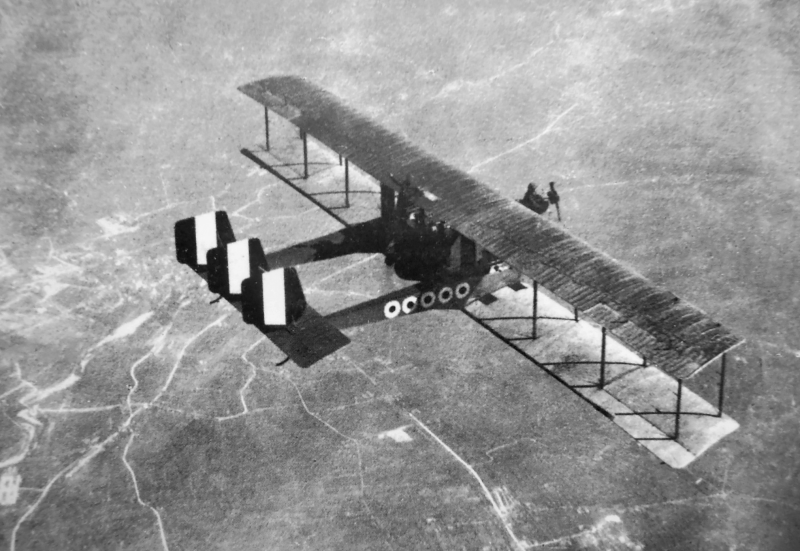
Giulio Douhet believed that modern warfare between large land armies was outdated; moreover, he believed that modern warfare favored defense. He made such conclusions based on the experience of the First World War.
Central to Douhet's theory is the thesis that only control of airspace can lead to victory in a war, regardless of which armies are on land or at sea. The general believed that without gaining air supremacy, the successful conduct of a modern war is impossible, and that this dominance can only be achieved by the forces of the air itself. fleet, which, through broad offensive actions, must quickly suppress the resistance of the enemy country.
This is how J. Douhet defines the concept of “air supremacy”:
He further notes that in order to achieve the ability to prevent the enemy from flying, it is necessary to deprive the enemy of all air assets, and this can only be achieved by destroying these assets either in the air, or in their bases, or in the factories where they are manufactured - in a word, everywhere , where their presence or production is possible [1].
From here Douhet comes to the conclusion that in order to suppress and destroy an air enemy, we need, first of all, powerful long-range bomber aircraft and air combat aircraft that could successfully destroy in the air enemy aircraft that had survived the aerial bombing and were trying to prevent bomber incursions. Douai proposes to combine these forces into an air army, operating en masse and independently of operations in the land and naval theaters, but in the general plan of war [1].
Since bombers, while carrying out their missions, can still encounter fierce enemy opposition in the air, the air army should also have special “air combat units”, the main task of which will be to pave the way for the bombers and push back opposing enemy air forces [2].
Given the high strike potential of aviation, Douai considered the offensive to be the best method of defense, since “Defending against an air attack requires more forces than the attack itself” [2].
The general envisioned the defeat and destruction of the enemy's air forces in a future war as a short act, boiling down to one or several massive air strikes and making it possible to immediately, with all available forces, move on to performing other important tasks: crushing the enemy as a whole, defeating his vital forces. centers, completely or almost not returning to the fight against air forces [2].
Douhet did not rate air defense systems highly; he considered improving air defense systems a waste of time and money. The air army, in his opinion, should disrupt mobilization, destroy railway junctions, warehouses, paralyze maritime trade and the enemy's navy, and destroy production centers. Enemy troops were last on the list of priority targets.
Douhet emphasized the operational independence of aviation operations in the air from the actions of armed forces on the ground. According to this theory, when air supremacy was achieved, massive bombing strikes on strategic targets followed. This provision determined the participation in a future war not of mass armies, but of achieving effect through the use of technology. According to the Italian general, the remaining types of troops should have been reduced, and their direct use should have been coordinated to support aviation operations [3].
In Douhet's view, a country that had lost air supremacy would find itself exposed to air attacks without the ability to respond to them with any degree of effectiveness; these repeated, incessant attacks, striking the country in the most difficult and sensitive parts, despite the actions of its land and sea forces, must inevitably lead to the conviction that all is useless and all hope is lost. And this conviction means defeat [1].
The fact that Douai's military doctrine envisages destructive attacks on cities, with inevitable casualties among the population, does not stand up to criticism from a moral point of view and may seem outrageous. However, it should be borne in mind that Douai, being a participant in the First World War, saw how the warring parties bombed each other's cities, killing large numbers of civilians.
It was clear to professional military officers that in the modern world, where all military installations, including industrial enterprises, are located in large cities, it is impossible to avoid civilian casualties [5]. The experience of the world wars shows that questions of morality have nothing to do with military planning.
Douai witnessed millions of men conscripted to war killed in the trenches at the front, thousands of times more than the number of civilians killed by bombing. And thinking in the same way as many military men, he was looking for a way out of the strategic impasse of trench warfare, so that this would not happen again [5]. The general was looking for a way to quickly win the war, and the military doctrine he developed seemed to be just that way.
Assessments of Giulio Douhet's theory and its application in practice
After General Douhet finally formulated and published in print the basic principles of his doctrine, he immediately gained many supporters and no less a number of opponents. As noted by the historian of military equipment Igor Drogovoz, even a special term appeared - duesism, and adherents of the Italian theorist began to be called duesists [2].
Among the most famous followers of the ideas of Giulio Douhet was the American General William Mitchell, who is the founding father of the US Air Force. Like Douhet, he belonged to the first generation of pilots and saw the future in bomber aviation. Mitchell expressed ideas that the fleet and battleship are an archaism of past days, that it is aviation that will bring victories in future wars. In 1925, the general retired, but had many followers who began to develop his ideas in practice and tried to achieve development for aviation [5].
A rather lively discussion around the Douhet doctrine took place in the 30s in the Soviet Union. In 1935, the military publishing house of the People's Commissariat of Defense of the USSR published a collection of selected works by Giulio Douhet, “Air Supremacy,” translated from Italian. In the same year, the book “Military Doctrine of Douai” by French Colonel Vautier, who was an ardent follower and propagandist of the ideas of the Italian general, was translated into Russian and published [2].
As Igor Drogovoz notes, the general assessment of his theory in the USSR was negative, since the basis for criticism of the Douai doctrine by Soviet military theorists and practitioners was the class approach. Ideological bias prevented an adequate assessment, so the “Douay Doctrine” received different labels in the USSR: bourgeois, adventurist and even fascist [2].
This is not to say that all the criticism was unfounded - Douhet's military theory certainly had its weaknesses. For example, commander Khripin, in the preface to the Soviet edition of Air Supremacy, rightfully criticized Douhet’s denial of the role of anti-aircraft artillery, noting that air defense systems will not be able to completely stop air attacks, but they will greatly constrain them, force the enemy to act in worse conditions, and will inflict damage on him. major losses. Khripin also believed that the war could not be won with air strikes alone [8].
Nevertheless, he admitted that Douhet’s idea was absolutely correct that the army and navy cannot compensate for the weakness of aviation and even simply survive with enemy air supremacy, since the actions of ground forces and the navy in conditions of air superiority of the air enemy will be very difficult [8] .
Another critic of J. Douhet was brigade commander Alexander Lapchinsky, who also believed that bombing alone could not win the war and criticized Douhet’s idea about the impossibility of effective air defense. At the same time, Lapchinsky himself made inadequate forecasts of the actions of aviation in the initial period of a future war, noting that “mass armies do not gather immediately, and the initial period of war is rightly considered the classic period for independent aviation operations”.
In addition, the Soviet military theorist also made the absurd prediction that all field artillery with a caliber of up to 150 mm would be used as anti-aircraft [8].
Despite the contradictory assessments of Douhet's theory, the obvious fact must be recognized that many aspects of his theory were adopted by all military powers with an air force at their disposal.
The theory of the Italian general was used by the allies, starting an unlimited bombing war against Germany - as the numerical growth of bomber aircraft, the command of Great Britain and the United States decided to shift the center of gravity of air strikes on the territory of the Third Reich from railway junctions to the systematic destruction of industrial facilities and residential areas in the largest industrial centers.
The results of the unrestricted bombing war turned out to be more than controversial: on the one hand, Allied aviation actually managed to achieve air supremacy over the Luftwaffe, especially at the final stage of the war (on the eastern front, strategic bombing on both sides was only sporadic), on the other hand, up to At the end of 1944 - beginning of 1945, German industry functioned quite successfully and did not reduce industrial output. Only in the second half of 1944 did unrestricted bombing begin to produce results, but entire cities were systematically destroyed along with the civilian population.
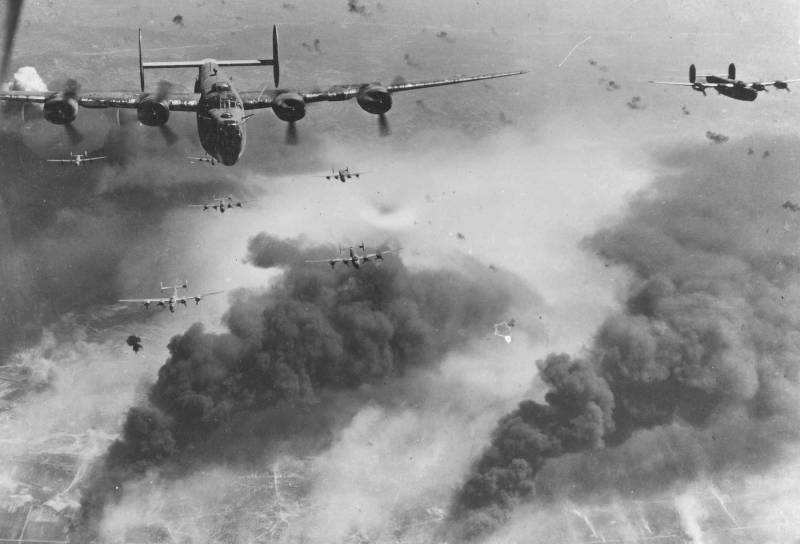
The situation was somewhat different in another theater of operations, the Pacific, where the United States and Japan collided - here, after a series of failures of the US Air Force, a decision was made to change command; General Curtis LeMay, who was a supporter of the Douhet doctrine, became the new commander. Lemay developed a new concept of bombing Japan, which corresponded to the doctrine of the Italian general [5].
LeMay knew that Japan had dispersed its industry to small subcontractors who were located in the business and industrial centers of Japan, and he decided to concentrate the attack not on the factories themselves, but on the urban areas with people where Japan's military-industrial complex was being created. Thus, on March 9, 1945, 1 tons of incendiary shells were dropped on Tokyo (665 units of B-325 bombers were used, 29 units flew to Tokyo), the area in which 279 thousand people lived turned into “hell on Earth,” including According to the lowest estimate, the fire killed 750 thousand people [84].
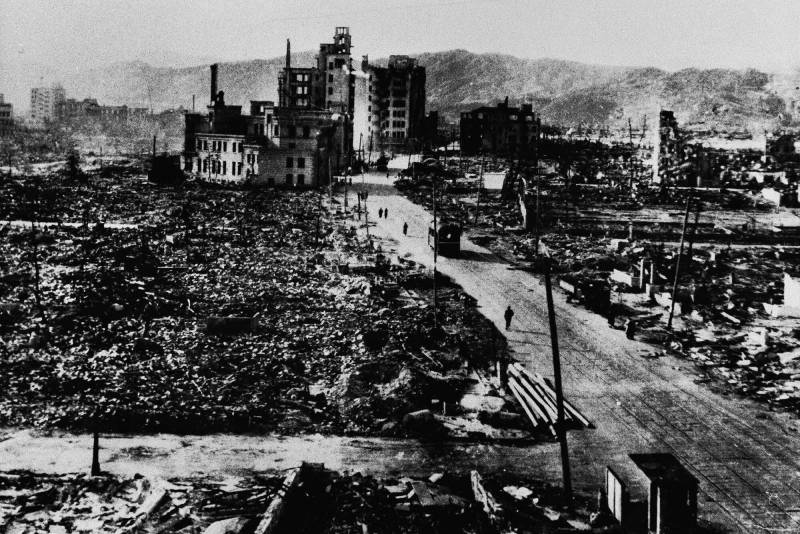
After several more bombings of this kind, the number of refugees exceeded millions, and the country was gripped by a humanitarian catastrophe. In just a week, Lemay proved that it was possible to defeat Japan without landing troops. Thus, American air power in the Pacific Ocean became one of the main factors in achieving victory.
The United States subsequently used the Douhet Doctrine during the Korean War (1950–1953) and also during the Vietnam War. And then there were Yugoslavia and Iraq, where, thanks to air supremacy, using technical innovations, the Americans were able to carry out military campaigns with minimal losses and complete moral and material destruction of the enemy [5].
In Yugoslavia, the ground forces of NATO countries did not take a direct part in the hostilities at all, but all the tasks assigned to the alliance’s aviation were completed. Operation Desert Storm, according to Igor Drogovoz, became a true triumph of the doctrine of General Douhet, clearly demonstrating to the whole world that the air force is not only capable of becoming, but has actually become the decisive force in wars of the new generation [2].
Conclusion
To summarize, it should be noted that already in 1921 Giulio Douhet believed that aviation was superior in importance to the army and navy and in the future should become an independent branch of the armed forces. He noted that aviation gives the offensive an advantage over the defensive:
“The new weapons of war completely change the situation, because they greatly increase the advantages of the offensive mode of action, while significantly reducing, if not outright eliminating, the advantages of the defensive mode of action” [1].
General J. Douhet was right when he said that only air supremacy can give the country complete security from air attack, and only with air supremacy can victory be ensured. At the same time, he went to extremes, absolutizing the importance of an air war, arguing that defense in such a war would be impossible.
However, Giulio Douhet's Air Supremacy is an undisputed classic of military strategy. In recognition of Douai, USAF historian Dr. Richard P. Hallion wrote: "In the pantheon of air force representatives, Giulio Douhet occupies a central place."
As historian Igor Drogovoz, who is a supporter of Douai, noted, against the backdrop of talk about wars of the future, the name of the author of this prophecy, who was able to essentially predict the onset of the era of wars of the sixth generation, was completely undeservedly forgotten.
General Douhet was the first in the world to properly assess the enormous capabilities of combat aviation and draw conclusions that are still relevant today:
“He who has air supremacy and has the appropriate offensive forces, on the one hand, protects his territory and his seas from enemy air attacks... on the other hand, he can take offensive actions against the enemy on a terrifying scale, which the enemy is not capable of to counteract anything” [2].
Использованная литература:
[1]. Giulio Due. Air supremacy. Collection of works on issues of air warfare. Preface to the Russian edition of the corps commander V.V. Khripin. M.: Military Publishing House NKO USSR, 1936.
[2]. Drogovoz I. G. Air blitzkrieg: The Douay Doctrine in the 2003st century or was the Italian general right? / I. G. Drogovoz; Ed. V. V. Beshanova. – Minsk: Harvest, XNUMX.
[3]. Gvozdev M. G. On the issue of the emergence of basic concepts for the use of the Air Force in the interwar period // Current problems of the humanities and natural sciences. 2013. No. 4. pp. 71–74.
[4]. Giancarlo Finizio. Fra guerra, aviazione e politica. Giulio Douhet, 1914–1916, Tricase, Youcanprint Self-Publishing, 2017.
[5]. Lezina E. P., Bukhlin I. E., Kazhaeva M. V. Military doctrine “Air supremacy” by Giulio Douhet and the history of its application in the USA / E. P. Lezina, I. E. Bukhlin, M. V. Kazhaeva / / Contentus. – 2023. – No. 3. – P. 34 – 42.
[6]. G. Rochat, L'esercito italiano da Vittorio Veneto a Mussolini, cit., p. 398.
[7]. R. Abate, G. Alegi, G. Apostolo – Aeroplani Caproni: Gianni Caproni and His Aircraft, 1910–1983, – Museo Caproni, 1992.
[8]. A. A. Chernilovsky. Forecasting a future war in the 1920s by the Italian general Giulio Douhet and criticism of his theory in the USSR [Electronic resource] // URL: https://cyberleninka.ru/article/n/prognozirovanie-buduschey-voyny-v-1920-h- godah-italyanskim-generalom-dzhulio-due-i-kritika-ego-teorii-v-sssr.
Information